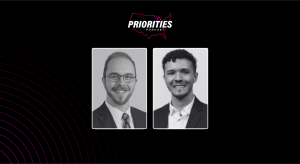Maine cyber chief steps down for Microsoft SLED job

Maine Chief Information Security Officer Nathan Willigar announced on LinkedIn Thursday that his final day heading IT security efforts for the state will be Sept. 19. He’s leaving for a position as customer security officer inside Microsoft’s state, local and education business.

Willigar, who has served with the state for more than a decade, is credited with advancing numerous cybersecurity initiatives, including pausing work on generative artificial intelligence to survey its risks, updating the state’s prohibited technologies list and responding to numerous cyberattacks, such as a China-affiliated attack against the state’s VPN software.
In his social media post, Willigar said the past six years, which is the time he’s spent as the state’s top cyber official, have been “especially meaningful.” He cited the ground-up creation of “a strong, resilient, and respected cybersecurity program” and a supporting team that allows Maine to “protect critical systems, respond to evolving threats, and strengthen the services citizens rely on every day.”
“This work demanded sacrifice — long nights, weekends, and tough decisions — but it also brought some of the most rewarding moments of my career,” he wrote. “Together, we built something that will last: a culture of collaboration, adaptability, and mission-driven excellence.”
A report recapping Maine’s IT work over the course of 2024 shows that Willigar’s work was wide-ranging. He saw that TikTok, or any application run by its operator, ByteDance Limited, was added to the state’s list of prohibited technologies run by foreign adversaries, a list that today also includes companies like Huawei, Kaspersky Lab and DeepSeek.
He writes in the report that the state made “significant strides” in enhancing cybersecurity, including implementing advanced threat detection and response systems, expanding training programs and building new partnerships, such as with the Multi-State Information Sharing and Analysis Center, the Elections Infrastructure ISAC (which has since been defunded) and the State, Local, Tribal, and Territorial Government Coordinating Council, a Department of Homeland Security partnership.
Willigar also helped the state to respond to numerous cyberattacks, including a zero-day exploit later tied to China that compromised the state’s Ivanti Connect Secure Virtual Private Network software. Last year, he also led responses to malicious software downloads and “at least five” attack campaigns. The report also notes that Maine was the target of a “China-affiliated espionage group” that was likely gathering intelligence.
He helped establish the state’s State and Local Cybersecurity Grant Program, to collect the state’s portion of the $1 billion federal program of the same name. “Initial efforts focused on implementing multi-factor authentication (MFA) to enhance access control, deploying cybersecurity training to improve staff vigilance, network segmentation, endpoint protection upgrades, and phishing simulations to identify vulnerabilities,” the report reads.
He helped the state secure its elections by improving logging to track potential threats and conducting specialized training for elections officials. The state technology bureau also developed a cybersecurity plan designed to harden the IT systems of the state’s water and wastewater providers. According to the report, this plan included “creating standardized risk assessments to identify vulnerabilities and developing contingency planning templates for rapid response to potential cyber incidents.”
Willigar wasn’t immediately available for an interview. On LinkedIn, he celebrated his new job as a way to “carry forward everything I’ve learned, and to support leaders at every level as they build for the future.”
“The mission continues — just on a broader stage. And I’m grateful for every step that brought me to this moment,” he wrote.






